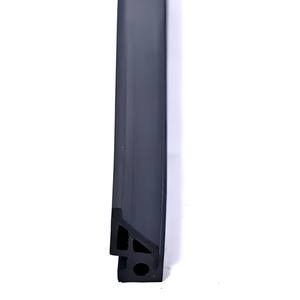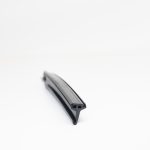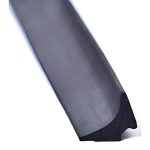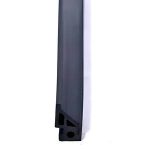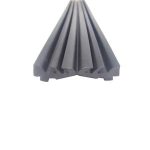Industrial seals are critical components used in a wide range of industrial applications to create a barrier between two surfaces, preventing the leakage of fluids, contaminants, or other materials. These seals come in various forms, materials, and designs, tailored to specific environmental conditions, pressures, temperatures, and the media they are intended to contain or exclude. In this comprehensive description, we will explore the types, functions, materials, manufacturing processes, and applications of industrial seals.
Types of Industrial Seals:
- Gaskets: Gaskets are flat or contoured seals placed between two mechanical parts to create a leak-tight connection. They can be made of materials like rubber, cork, paper, metal, or composite materials.
- O-Rings: O-rings are circular or torus-shaped seals commonly made of elastomers, such as nitrile, silicone, or Viton, and are used to create a reliable seal in rotating or reciprocating applications.
- Lip Seals (Oil Seals): Lip seals consist of a flexible lip that contacts a rotating shaft to prevent the ingress or egress of lubricants or other fluids, making them essential in machinery and automotive applications.
- Diaphragm Seals: Diaphragm seals are designed to separate two environments, often used in pressure measurement devices, and are usually made from materials like PTFE or stainless steel.
- Mechanical Seals: Mechanical seals are used in rotating equipment, such as pumps and compressors, to prevent leakage between the rotating shaft and the housing. They often feature multiple sealing components and can be made of various materials.
- Expansion Joints: Expansion joints are flexible connectors that absorb thermal expansion, contraction, and vibration in pipes and ducting systems, preventing damage to the surrounding infrastructure.
- Thread Seals: Thread seals are used to prevent fluid or gas leaks in threaded connections and are often made from materials like PTFE tape or thread sealant compounds.
Functions of Industrial Seals:
- Leakage Prevention: The primary function of industrial seals is to create a barrier that prevents the escape of fluids, gases, or contaminants from a contained space, ensuring the integrity of the system.
- Environmental Protection: Seals protect sensitive equipment from environmental factors such as dust, moisture, and corrosive substances.
- Energy Efficiency: By preventing leaks and reducing friction, industrial seals contribute to improved energy efficiency, particularly in machinery and automotive applications.
- Safety: In industrial settings, seals contribute to safety by preventing the escape of hazardous substances and maintaining the stability of pressurized systems.
- Vibration and Noise Control: Some seals help absorb vibrations and reduce noise, providing a quieter and more stable working environment.
Materials Used in Industrial Seals:
The choice of material for industrial seals depends on the specific application and the environment in which they will operate. Common materials include:
- Elastomers: Rubber compounds like nitrile, silicone, EPDM, and Viton are widely used for their flexibility, resilience, and resistance to various chemicals.
- Plastics: Materials like PTFE (Teflon) are known for their excellent chemical resistance and low friction properties.
- Metals: Stainless steel, carbon steel, and other alloys are used for their strength and corrosion resistance in high-pressure and high-temperature applications.
- Composites: Composite materials, such as graphite reinforced with metal, offer a combination of strength and flexibility.
Manufacturing Processes:
The manufacturing of industrial seals involves several processes, including material selection, cutting, molding, extrusion, or machining, as well as surface treatments like coating or plating. The design and production methods vary depending on the type and complexity of the seal.
Applications of Industrial Seals:
Industrial seals are utilized in a wide range of industries and applications, including:
- Automotive: O-rings and lip seals are used in engines, transmissions, and various vehicle systems.
- Machinery: Gaskets and mechanical seals are essential in pumps, compressors, and other rotating equipment.
- Chemical Processing: Seals are used in chemical reactors, piping, and storage tanks.
- Oil and Gas: Seals play a crucial role in wellhead equipment, pipelines, and refineries.
- Aerospace: Diaphragm seals are used in aircraft for pressure measurement and control.
- Pharmaceuticals: Hygienic seals are used to ensure the sterility of pharmaceutical manufacturing processes.
- Food and Beverage: Seals are employed in processing and packaging equipment to maintain product quality and hygiene.
- Construction: Expansion joints are used in bridges, buildings, and infrastructure projects to accommodate movement and prevent damage.
- Marine: Seals are used in ships and offshore structures to handle the dynamic forces of waves and harsh marine environments.
In conclusion, industrial seals are indispensable components in a wide array of industries, playing a crucial role in maintaining the integrity, safety, and efficiency of systems by preventing leaks, protecting against environmental factors, and ensuring the containment of hazardous substances. Their diverse types, materials, and functions make them versatile solutions in various industrial and commercial settings.
